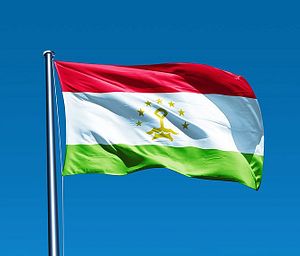Will Muhiddin Kabiri, the leader of the Islamic Renaissance Party of Tajikistan (IRPT), return to the country this week to celebrate the 18th anniversary of the peace treaty that ended the Tajik civil war?
According to Asia-Plus, on Monday, the party’s deputy, Mahmadali Hayit, told a news conference in Dushanbe that while Kabiri plans to return the party advises him to stay away.
“We advise Muhiddin Kabiri not to return to Tajikistan until a real peace is reestablished in the country, until the authorities stop pressure on the IRP members,” Hayit said.
Kabiri left the country shortly after the March parliamentary election results were revealed. The election, like every election the country has held, was judged to be unfair. His party, which has come under increasing pressure by the government, lost its last two seats. Although largely nominal, IRPT’s presence in parliament (two seats out of 63), was to many observers at least a nod to democracy. It was also a visible piece of the peace treaty that ended the devastating Tajik civil war.
The Tajik civil war pitted the people of Garm and Gorno-Badakhshan, in central and eastern Tajikistan, against the central government. Ranging from democratic reformists to Islamists, those fighting the government joined together to form the United Tajik Opposition (UTO). The war raged from 1992 to 1997 and resulted in the death of between 50,000 and 100,000 people, a million more were displaced. The peace settled between the opposition and the government rested on reconciliation and the inclusion of the opposition into a coalition government. Members of the opposition were to receive a 30 percent of government positions.
Interfax noted that “this quota decreased every year: representatives of the United Tajik Opposition were forced to leave the administration, and many of them were convicted or killed.”
Kabiri says that “the condition for the implementation of the peace agreement are massively violated by the authorities” and that while the international community is fixated on ISIS, “some people in government feel that now is a good chance to take revenge on our party. This is a big mistake because they are creating a new conflict.”
Kabiri, currently in Moscow, gave an interview with RFE/RL’s Tajik service (Radio Ozodi) on June 19 in which he stated his intention to return. In that interview, as well as in another with Eurasianet, Kabiri commented on growing rumors that the government is building a case against him and intends to arrest him should he return to the country.
Asia-Plus repeated reports from Fergana News quoting Kabiri speaking at a conference on June 17 in Moscow:
I am surprised by announcements state-owned mass media carried on the eve of a holiday [The National Unity Day celebrated on June 27] on a criminal case in preparation against me, allegedly because I incorrectly sold my property 17 years ago. What criminal case [could be brought against me] if that was my private property? In any event, if there are questions I need to respond to, they could be discussed after the holiday; after all, I was a member of parliament twice over these 17 years and there were many amnesties.
Such a random criminal charge would not be absurd. For example, in February Jamoliddin Mahmudov, an IRPT leader and member of Tajikistan’s Central Election Commission, was arrested. The charge? Illegal weapons possession. The authorities claimed that in 1996 (during the civil war) Mahmudov gave another IRPT member, Latif Sardorov, two Makarov pistols.
Almost in tandem, Tajiks have become more pious just as the government has become more restrictive when it comes to the practice of Islam. The IRPT, which is the region’s only registered religious party, is an Islamist party–but its politics have long been moderate. Even Kabiri’s latest comments leave room for Tajik President Emomali Rahmon to be a good guy.
“We still hope Mr Rahmon is not part of the anti-peace process. But some people in government and around him feel it is a good time to stash [the peace treaty] in an archive somewhere,” Kabiri told Eurasianet.
The peace in Tajikistan has held for nearly two decades but it may prove to be a fragile thing after all. International preoccupation with Islamic extremists in Afghanistan and the ghost threat of ISIS in Central Asia has been exploited by the Tajik government and could easily leave the IRPT out in the cold.
The backlash against the party has been building over the past few months, with state-sponsored mullahs calling for its disbandment. In an open letter to the president the party expressed its “extreme concern about the pressure, threats, slander, open and covert offenses by government bodies with regard to party members and officials.” According to Interfax the letter continued, making refernece to the recent defection by Gulmrod Halimov, former commander of state special police (OMON), saying that “Isn’t it high time to look for sources of manifestations of extremism and terrorism in government bodies, in law enforcement in particular, not in IRP, clergy or mosques? Or should we wait for several more officers and other officials from these bodies to join terrorist groups?”
There seems to be a building exodus, nonetheless, whether it is sincere or prompted by government threats, is unclear. Recent reports that several IRPT local leaders have quit in Youtube videos uttering phrases like “Islam does not require a party” don’t bode well for the party. What happens to Kabiri, should he return to Tajikistan, will be worth watching carefully.

































